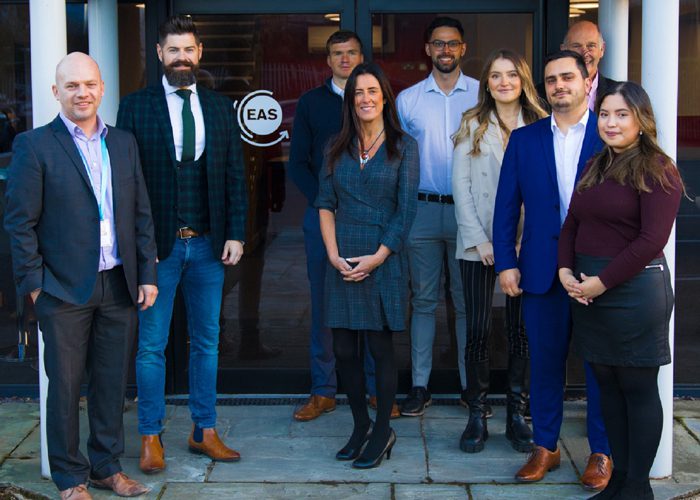SOFTWARE automation specialist Endpoint Automation Services LTD (EAS), which has an office in Glasgow, is celebrating its recent success in working closely with Central and North West London NHS Foundation Trust (CNWL) to achieve major cost savings.
EAS created a fully functional RPA process for CNWL, eradicating an enormous manual data-inputting burden and delivering savings equating to approximately three full-time band 3 staff at an equivalent cost of £98,500 and freeing staff to work on other valuable and less repetitive roles.
CNWL serve two Integrated Care Systems (ICS) and seven local authorities, as well as managing one of the largest school aged child immunisation programmes in England, providing up to 100,000 vaccines during the academic year. This programme increased hugely during the pandemic when the team began to support the Covid vaccination alongside flu.
Up until then, the Trust used a paper-based system for parental consent forms, meaning that the details of every child vaccinated were inputted manually on to TPP’s SystmOne electronic record system.
This is needed to produce management reports to the National Immunisation and Vaccination System (NIVS), which CNWL must do within five days of a vaccination, as well as providing monthly statistics to the Child Health Information Services. Both are an important part of government decision-making in the wake of the pandemic.
This placed administrative pressures on CNWL as they were having to utilise a paper-based system for consent-form handling, producing reports to NIVS within five days of vaccination.
CNWL found it almost impossible to meet the data entry demands without drawing on additional resource and finances which led to CNWL’s decision to move away from paper and digitalise the process with Thomson SchoolScreener, a recognised school nursing services application, and to use robotic process automation (RPA) to extract and input the necessary data to share with SystmOne.
The number of influenza vaccines CNWL gives annually has more than doubled as the government increased the eligible cohort of school year groups to be offered a vaccine.
This put pressure on the Trust’s administration team with the time-consuming task of inputting up to 1,400 consent forms a day onto TPP’s SystmOne.
The only way for CNWL to achieve this was to draw on resources from other teams, work overtime and use temporary staff. The burden couldn’t continue and the introduction of digitalisation/automation was the only way it could be addressed.
Andrew Massey, Robotic Process Automation Project Manager Digital & Innovation Group at CNWL, said: “With the growth of the programme, it was not sustainable to continue with having to manual handle paper-based consent forms.
“A digital solution was needed which met our need to manage the programme while also allowing us to continue providing our health partners with the clinical details through SystmOne….it was decided that using RPA could fulfil our needs to transfer data recorded in SchoolScreener to SystmOne.
“EAS had the best understanding of our challenges and its previous experience of working with NHS organisations meant it could quickly get to grips with the project. Joining with them was a real turning point. They immediately put in place a dedicated project manager and developer to build a robot to extract and input the information to be transferred between the two applications. Additionally, their team structure meant that when issues arose, they could be immediately addressed unlike our experience of the inexperienced supplier which saw a time lag before any resolution.”
EAS was able to create a fully functional RPA process for CNWL in just five weeks which put the timetable back on track so that the new system was ready to fully ‘go live’ at the start of the 2022/23 academic year.
There are already significant savings identified Andrew confirms: “Compared with when we were having to manually input the data, the Trust will be making real financial savings with an average daily saving of 26 hours staff time.”
No longer will additional funds have to be found to ensure it can process the immunisation records. Based on initial findings the staff time saving will be 26 hours per day during an academic year. This equates to approximately three full-time band 3 staff at an equivalent cost of £98,500 and freeing staff to work on other valuable and less repetitive roles.
The Trust has already identified further RPA programmes to build upon the benefits automation brings in increasing efficiencies.
Andrew Massey (CNWL) comments on the scaling up opportunities: “As the programme grows so does the possible savings which will potentially free up funds for clinical services.
“We do know that the new systems and processes will provide greater accuracy which ensures the data quality and consistency which will help inform the programme and the decisions made by the Department.”
Russell Lawrie adds: “We are thrilled at the results we were able to achieve through collaborative working with the forward thinking and informed team at CNWL.
“EAS is a dedicated service provider to the public health sector, and we use cutting edge software technology, in-depth knowledge and class-leading service delivery, to achieve significant benefits for them and their patients. We are firmly committed to freeing up public sector teams, so they can focus their time on more valuable services, and releasing budget for vital patient-facing services.
“By sharing news of our successes, we are keen to generate widescale awareness on what is achievable by harnessing the latest in Robotic Process Automation (RPA) solutions to deliver substantial back office cost savings for public health organisations, so we can support even more public health bodies.”
EAS specialises in producing Robotic Process Automation (RPA) solutions, and with a background in complex IT and cloud automation, offer automated processing. Since establishing the business in 2015, EAS has achieved to date over £4 million in cost savings for its clients, through the development and deployment of software robots to replace manual, repetitive processes and freeing up valuable employee time to focus on more complex tasks.
For more information on EAS visit: www.easuk.co.uk
